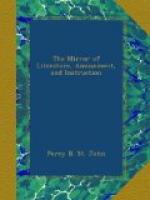Upon the threshold of that home, from which
My father spurn’d her—over whose pale corse
I swore to hunt, through life, her ravisher—
Nor ever from by bloodhound track desist,
Till line and deep atonement had been made—
Honour for honour given—blood for blood.
“The Queen orders Gonzales to death; but the monk accuses her of the intended murder of Francoise, and produces her written order to that effect. The King can no longer be blind to his mother’s crimes; she is disgraced, degraded, and condemned to pass the rest of her days in a convent.”
Here the fourth act, and the acting play closes. In the fifth De Bourbon reappears. Lautrec proposes to join him, and assassinate the King, in revenge for the ruin of Francoise. The memorable battle of Pavia ensues, and terminates with the death of the King and the triumph of Bourbon.
Triboulet, the jester of the Court of Francis, is introduced with some pleasantry, by way of relief to the darker deeds.
We cannot conclude this imperfect sketch better than by the following judicious observations from the Quarterly Review: “How high Miss Kemble’s young aspirings have been—what conceptions she has formed to herself of the dignity of tragic poetry—may be discovered from this most remarkable work; at this height she must maintain herself, or soar a still bolder flight. The turmoil, the hurry, the business, the toil, even the celebrity of a theatric life must yield her up at times to that repose, that undistracted retirement within her own mind, which, however brief, is essential to the perfection of the noblest work of the imagination—genuine tragedy. Amidst her highest successes on the stage, she must remember that the world regards her as one to whom a still higher part is fallen. She must not be content with the fame of the most extraordinary work which has ever been produced by a female at her age, (for as such we scruple not to describe her Francis the First,)—with having sprung at once to the foremost rank, not only of living actors but of modern dramatists;—she must consider that she has given us a pledge and earnest for a long and brightening course of distinction, in the devotion of all but unrivalled talents in two distinct, though congenial, capacities, to the revival of the waning glories of the English theatre.”
[1] This disadvantage is greater on the stage, since
the audience neither
see nor hear more of Bourbon,
and only four acts of the piece are
performed. In the closet
it will not be so obvious, as Bourbon
returns in the fifth act.
[2] This is an entire variation from history.
* * * * *
SPIRIT OF THE PUBLIC JOURNALS.
OLD ENGLISH MUSIC.




